Why hello there.
It’s been a long time, huh? Whether you know us from the bygone era of 2013, or are reading us for the very first time, we’re very glad to have you.
As the age of the indie publication seems to wane, these are uncertain times for us music lovers. As The 405 ended its run, many of its writers, yours truly included, wondered what was next. We decided it was high time we brought Beats Per Minute back to life, and joined families from both sites to create something that we hope continues and expands the spirit of both sites.
What might that be? With music criticism morphing into ever more of a hype machine, it often feels like the same ten albums, by largely the same ten artists, are given most of the love each year, only in slightly different rankings.
With this little resurrection of our publication, we’re hoping to bring you something a bit different, more personal. We hope to shine a light on albums that might not get the love they deserve. If we can make one promise, it’s that we’ll cover the music that reaches us. Our lists, reviews and interviews are no pompous declaration of what you should like, but just collections of things that have spoken to our writers.
Each and every one of these albums on this page matter to us. Hopefully, then, you’ll find something to love for yourself. It’s a mission that we hope to maintain and hone as we continue to rebuild Beats Per Minute.
If you’re interested in what we’re doing, and want to be involved with writing, photography, graphic design or anything else, please don’t hesitate to get in contact.

András
Joyful
[Beats In Space]
To call Joyful a delight is like calling a freshly ripe strawberry “adequate sustenance”. This thing is a delight, emphasis necessary. While all deep house surely hopes to, at the least, get our heads bobbing, this aspiration is often is all-too-easily lost by means of the method. To put it plain, ego and pretension often get in the way, sacrificing, well, the joy of it all by an obsession with technique. András, by comparison, has nothing to offer but deeply felt warmth. Every second of Joyful is pure fun, perfect for drives, lazy days at home, and anything in between. Despite the Australian artist finding inspiration in the “decay of dance music”, the tunes found here couldn’t feel more carefree. If you’re in search of a worthy companion for this looming Coronacation, it’ll be nigh impossible to find a worthier applicant for the gig.
-Chase McMullen

Arborist
A Northern View
[Rollercoaster Records]
Arborist, as you’ll immediately note upon listening, hail from Belfast, Northern Ireland. Their music owes a lot to the regional sounds that are likely already jumping to mind for you. Suffice to say, they write emotive folk music. However, where A Northern View truly excels – and what makes it stand out from an impressive pack – is that it nails something folk music often faces difficulty in finding: atmosphere. Whereas much folk (often to its credit, to be sure) sounds like it could as easily be playing live in a bar as on your speakers, Arborist have developed a moving sonic world with A Northern View. Largely a musical retort to Brexit, and its effect on Northern Ireland, this gripping, relevant album also finds time for moving portraits of people and family. An unexpected gem.
-Chase McMullen
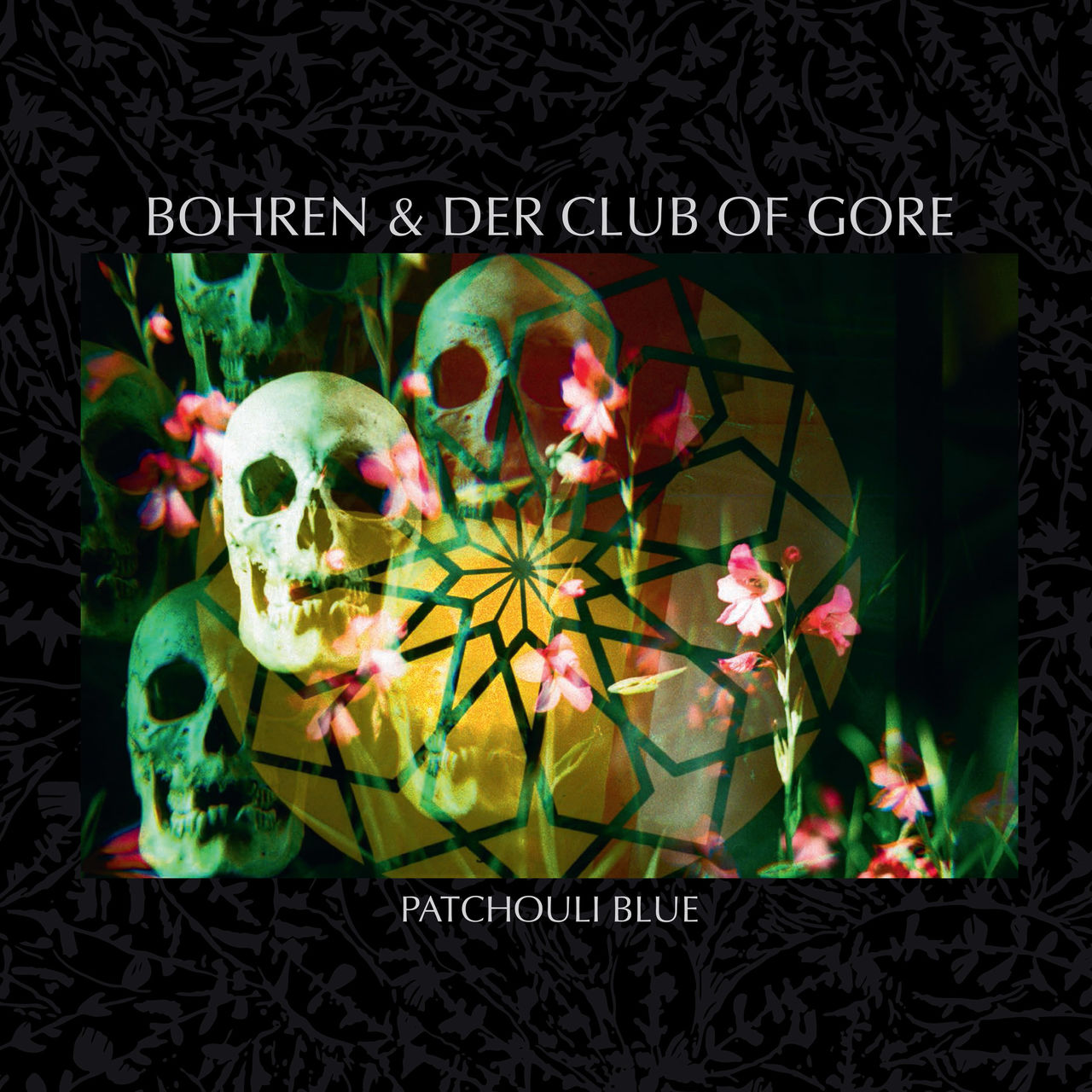
Bohren & der Club of Gore
Patchouli Blue
[PIAS Germany]
Despite what the album’s skeletal cover art may lead you to believe, Bohren & der Club of Gore have chilled out somewhat over the years. Practically an institution at this point, having been operating for nearly 30 years, the dark jazz/dark ambient collective has gradually shied away somewhat from the complete, crushing blackness of their earlier efforts, coming to favor a more subtle palette that is nonetheless grim and truly atmospheric. Where their music once may have been more akin to rage, Patchouli Blue is full of melancholy. Nearly regal in its funereality, the group are painting in subtler shades than perhaps ever before, but the music is no less evocative. Mood music for your deathbed.
-Chase McMullen
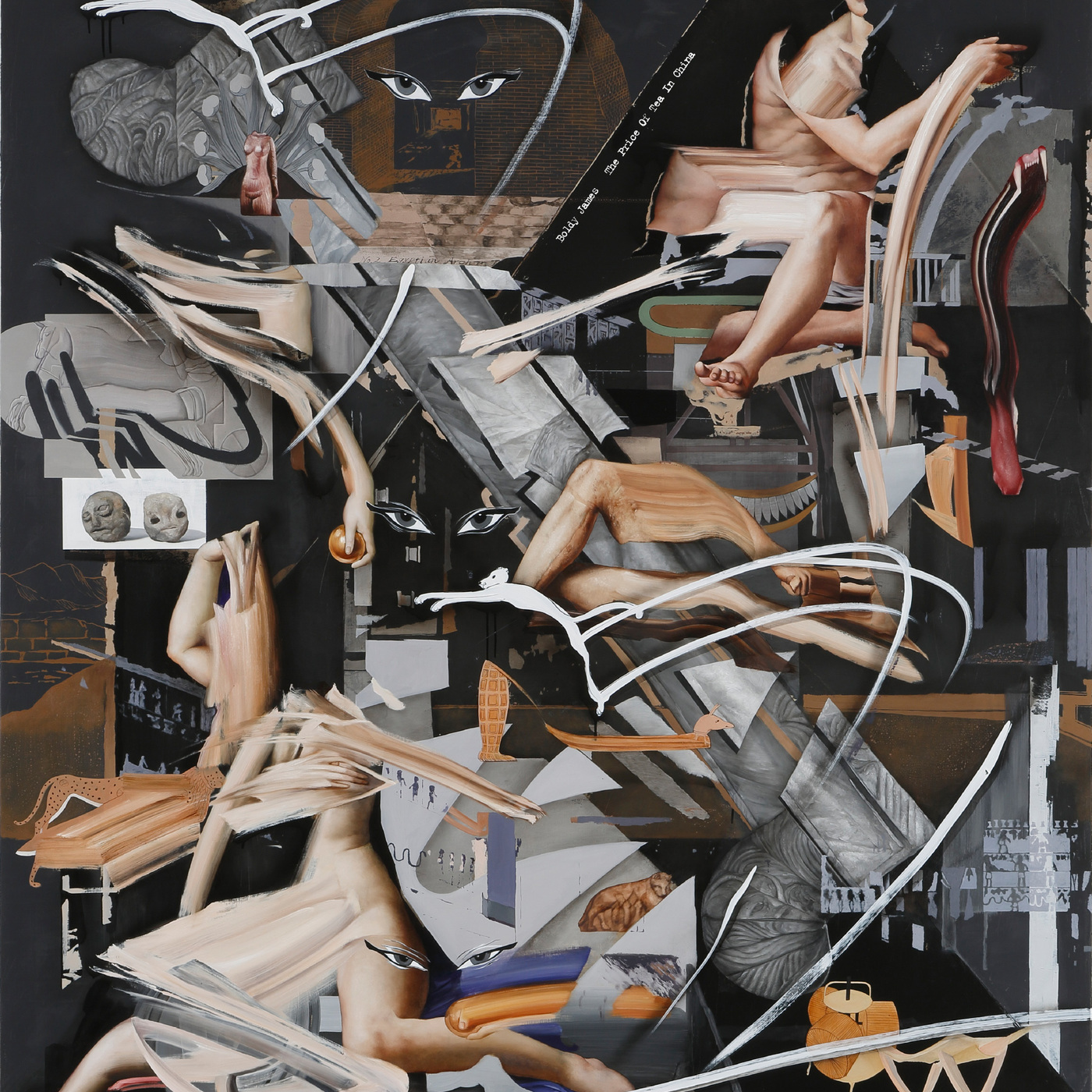
Boldy James & The Alchemist
The Price of Tea in China
[ALC]
Some pairings just work. The Alchemist has worked with some peak talents throughout his storied career, consistently delivering quality, but even for him a project that truly gels is a rarer thing. Curren$y struck a chord in 2011, and perhaps no MC will ever reach the perfect synthesis the beatsmith had with longtime friend Prodigy (man, does his loss still sting), but we can add Boldy James to the list of ideal companions. True, the two collaborated in 2013, but that release felt closer to Boldy simply rapping over a selection of beats. Their recent second full length, The Price of Tea in China, feels like a true collaboration on every level.
Alchemist lays out the classics, and Boldy devours them. The production has a consistent, iced over, menacing, even glacial vibe, and it casts a shadow over the entire project, creating a truly essential producer/MC pairing. Boldy, for his part, is often underrated. True, he prefers to keep it low key, but he knows just how to get the point. Something like a grimmer, more brutal Guru, it’s his very simplicity that makes him essential. Let me say it plain: this is the best Hip Hop release to grace 2020 thus far, and it’s going to be a tricky one to top. Take note.
-Chase McMullen

Bonny Light Horseman
Bonny Light Horseman
[37d03d]
There’s no anticipating supergroups, they appear out of the ether. This January brought us Bonny Light Horseman, a folk supergroup bringing Anaïs Mitchell, Eric D. Johnson (Fruit Bats), and Josh Kaufman (Josh Ritter, The National, Bob Weir) together out of a musical chemistry and shared love of traditional folk music. Bonny Light Horseman is a folk revivalist project, but one that’s okay shirking academic or archivist intentions—songs freely use their 20th century evolutions and add new choruses to verse-only songs. It’s not “old” sounding in the manner Sam Lee’s or Alasdair Roberts’ folk interpretations (or even Anaïs Mitchell’s Child Ballads with Jefferson Hamer from 2013). If the songs didn’t sneak in mentions of Napoleon and bonny colleens, many could pass as new indie folk creations. Both supergroups and folk interpretations come with a sense of “let’s see if this works” experimentation that’s still apparent here (I’ll just say I’m surprised “Jane Jane” was a single), but there’s an obvious passion for the material that cynical intentions to fix old music could never create.
This project shines best showing the tender emotional hearts to these old songs, like on the group’s namesake, a simple refrain that builds in pleading intensity, or on “Bright Morning Stars”, an Appalachian spiritual that adds Justin Vernon to complete the song’s gorgeous power in near a capella. For the sake of everyone following modern folk revival, Bonny Light Horseman can’t be allowed to be a one-off.
-Josh Sand
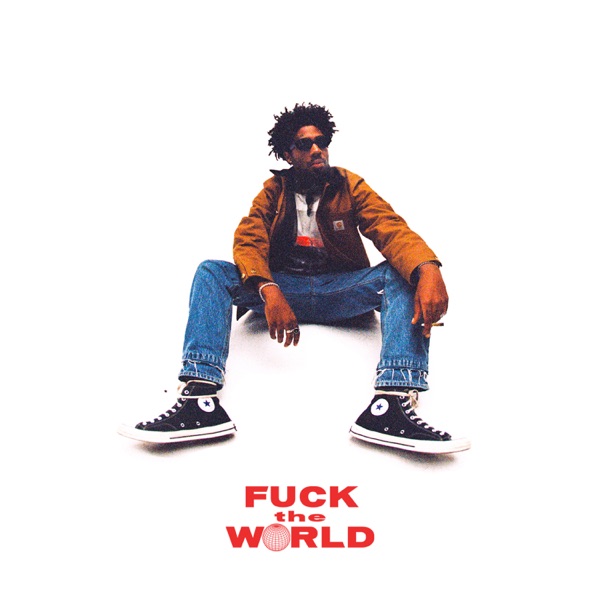
Brent Faiyaz
Fuck the World
[Lost Kids]
Genre terms are often inconclusive, but R&B has always been one of the most ill-fitting and reductive. That’s where we find ourselves with Brent Faiyaz and his latest, Fuck The World, which fits the usual R&B requirements, while also being chock-full of deep bass drums. At other times he forgoes the drums and makes his own rhythms. His lyrics are an honest dive into his own relationships and place in the world that crossover into social commentary as he croons, “I’d probably be dead if I were basic.” This 24-year-old is defining his own sound as much as his own rules and his Fuck The World philosophy is as bracing as it is disturbing.
-Lauren Mullineaux
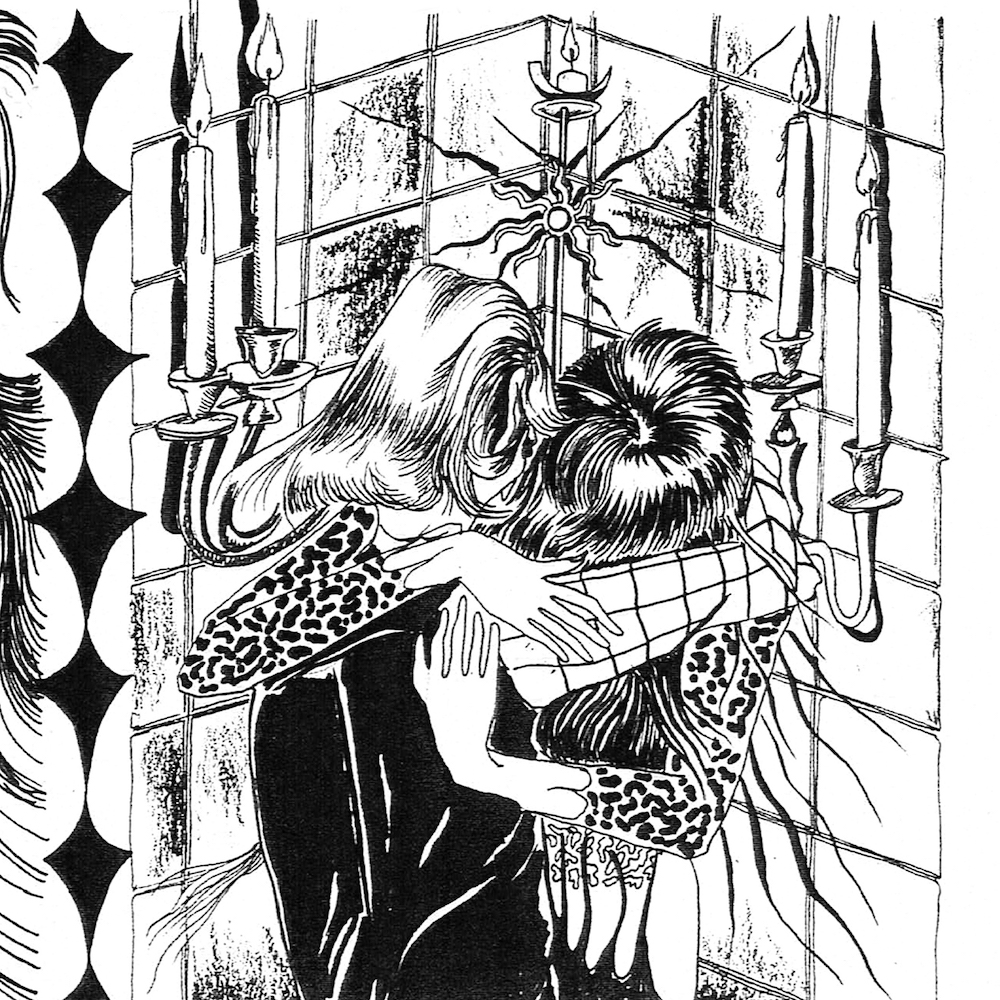
Cindy Lee
What’s Tonight to Eternity
[W.25TH / Superior Viaduct]
As Cindy Lee, Patrick Flegel makes music that makes you feel like you’re creeping into someone’s private dream journal. Like their brother and former Women bandmate, Matt (now of Preoccupations), Cindy Lee is expressing burdens in obfuscated terms. However, unlike Matt, Cindy Lee’s are obfuscated sonically as well as lyrically. Their voice is frequently rendered as a shadow of itself, a falsetto with an emphasis on fall, with hazy instrumentation to further the despair. What’s Tonight to Eternity isn’t moving in spite of its cloudiness, but because of it.
-Brody Kenny

Craven Faults
Erratics & Unconformities
[The Leaf Label]
Erratics & Unconformities is the debut album from the mysterious synth-head that works under the name Craven Faults, following up the trilogy of EPs Lowfold Works. One fact that is known about Craven Faults is that they’re based out of a disused mill in Yorkshire, and this is a crucial starting point when entering the evocatively synthesized and enveloping world of their music, which spirals slowly out from this base. Erratics & Unconformities is a drifting psychogeographical voyage through misty forests, as occasional beats trudge like a death march, taking you to ancient sites like the “Vacca Wall” and “Cupola Smelt Mill”. It’s a patient record that moves almost imperceptibly, but engrossingly transports you through time and space.
-Rob Hakimian
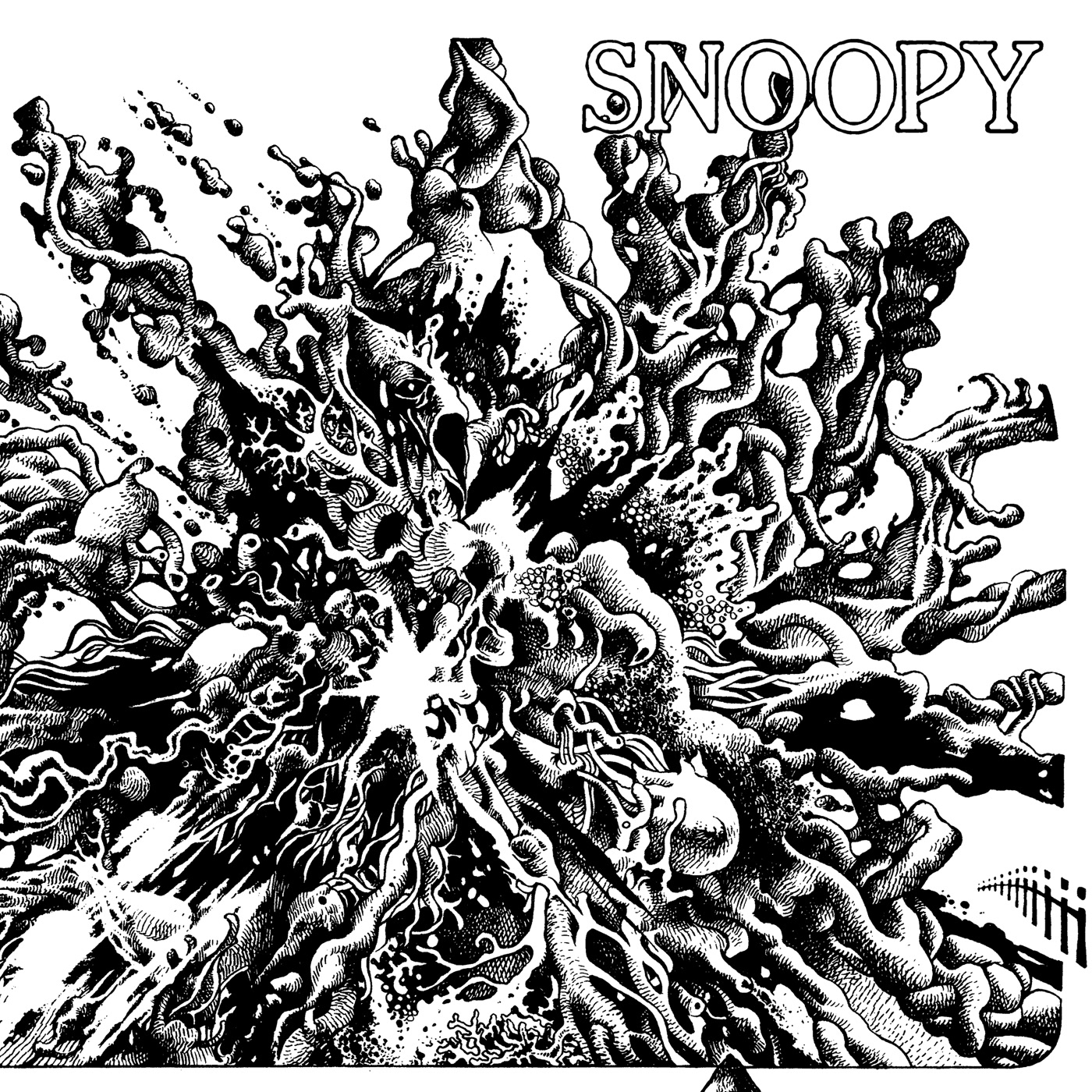
CS + Kreme
Snoopy
[The Trilogy Tapes]
“Heal yourself from the inside,” is the mantra repeating in “Blue Flu”, and when listening to the new album Snoopy by CS + Kreme, one gets the feeling that there is a sort of healing that’s happening. This collection of 8 slow-moving songs sinks its talons into unsuspecting listeners and transports them into a hallucinogenic realm where purgation is demanded. This is a special album, and after that first listen, it becomes obvious that people of the future will look back to 2020 as the year of Snoopy. Combining multiple musical elements, including jazz, classical, and even world music, CS + Kreme have created something important and lasting; they’ve created an event. Most of us here pride ourselves in enjoying music that pushes boundaries and alienates the average and ordinary music fan, and Snoopy does exactly that; the proverbial envelope has burst open with this release. Put your headphones on, lay back and “heal yourself from the inside.” CS + Kreme demands it.
-Scott Zanassi
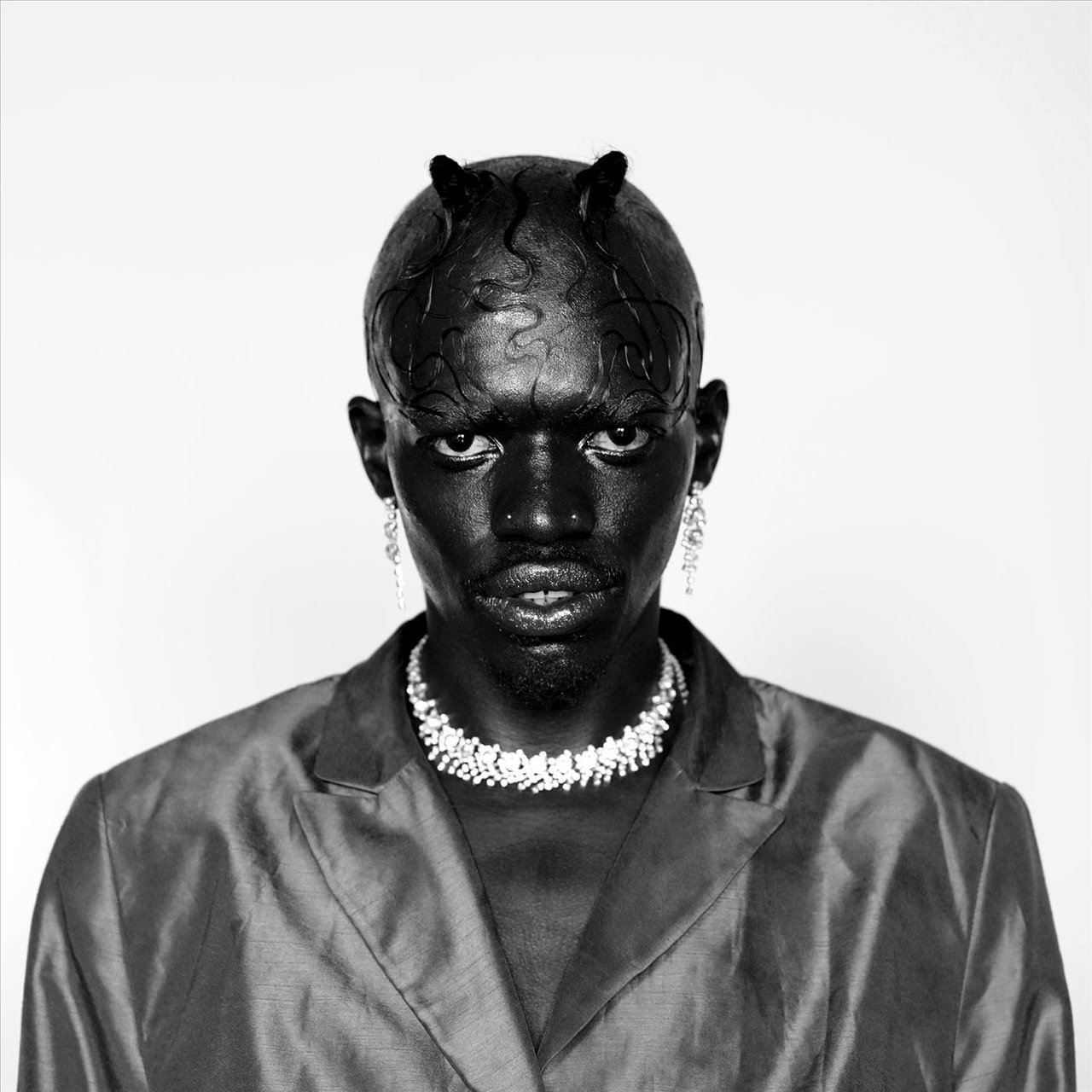
Desire Marea
Desire
[Izimakade Records]
Known for their work as part of South African performance art outfit FAKA, Desire Marea is no stranger to complicated musical explorations when skirting the intersections of art and spirituality, of culture and personal identity. Through the use of vivid beats that should be forever enshrined within various club mythologies, fractured house rhythms, and arrangements built from unexpected instrumental movements, Marea’s self-titled debut is a whirlwind of hypnotic tones and intonations intent on sacred and secular revelation. Drawing upon a seemingly endless parade of local sounds, with the cascading echoes of South African dance floors filling the spaces alongside Marea’s noisy club hymnals, the record deftly balances nightlife inclusivity with a more intensely personal introspection.
There are moments when the album’s atmosphere is charged with a kinetic disturbance, resulting in a divine storm of droning sounds, energetic collages, and cross-genre experimentalism. These songs aren’t content to be a passive landscape where your attention can wander without regard for danger or opportunity. Marea sets out to create an environment where you are constantly shifting between realities, where the pull of a single idea offered within the span of a few seconds invites hours of passionate consideration. This record speaks to broad ideologies and personal truths and revels in the examination of physical and mental sensation – and is unafraid of both the questions and answers that this series of intimate analyses is likely to produce.
-Joshua Pickard
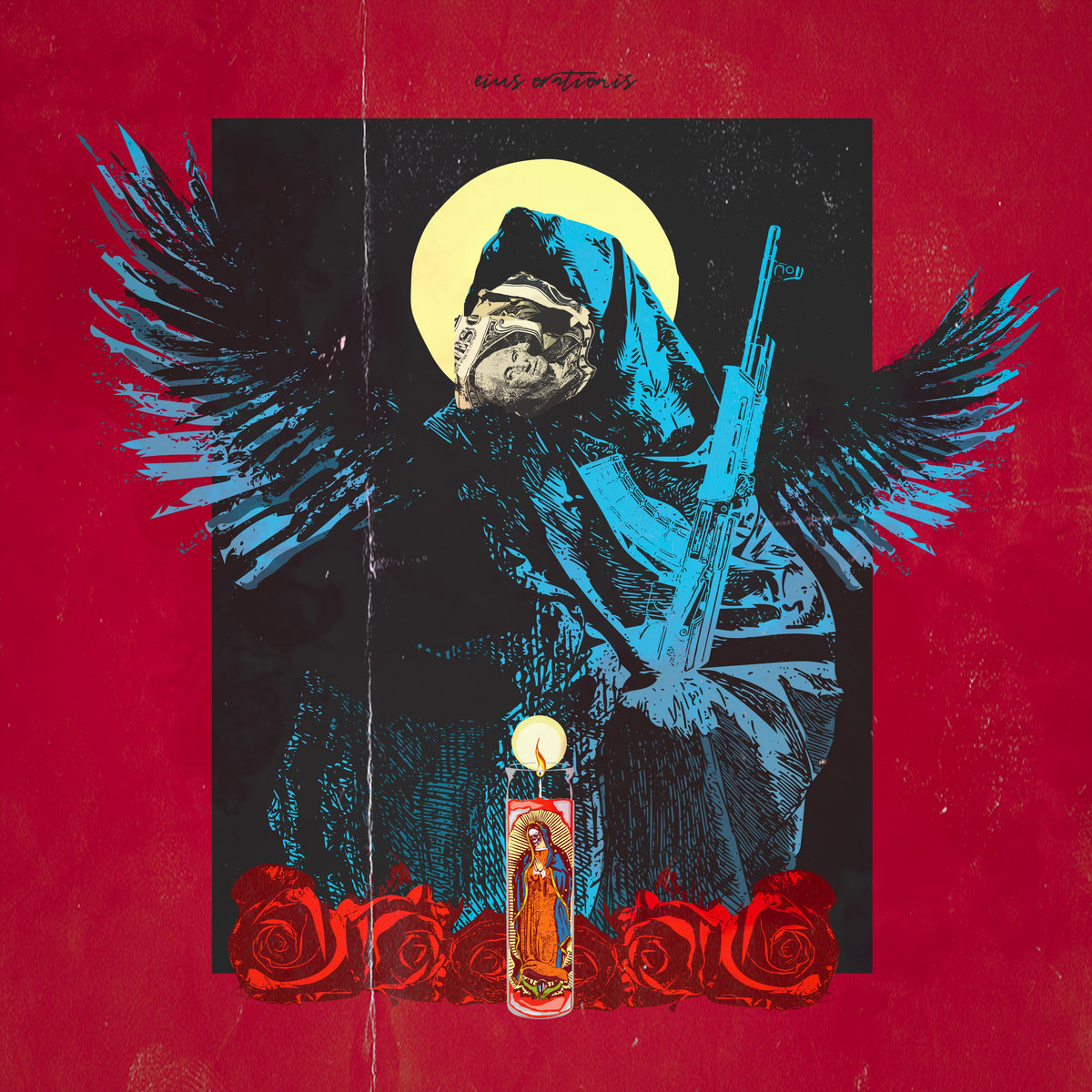
Elcamino & 38 Spesh
Martyr’s Payer
[T.C.F. Music Group]
Make no mistake about it, 38 Spesh is an MVP producer at the moment. First catching genuine hype alongside Griselda favorite Benny the Butcher, the Rochester, New York producer (and rapper, too, lest we forget) is fashioning himself into something of an even grimier Alchemist. He’s paid tribute to the greats, linking up with Kool G. Rap for a full length collaboration in 2018, not to mention Planet Asia this year, but it’s his work with Griselda disciple Elcamino that stands out from the pack. A delightfully brief affair, all too easy to put back on as soon as you’ve finished it, Martyr’s Prayer is wall-to-wall tasteful, pared-back production that nonetheless hits hard. Oh, and bars. Lots and lots of sinister bars. This is Griselda family, after all.
-Chase McMullen
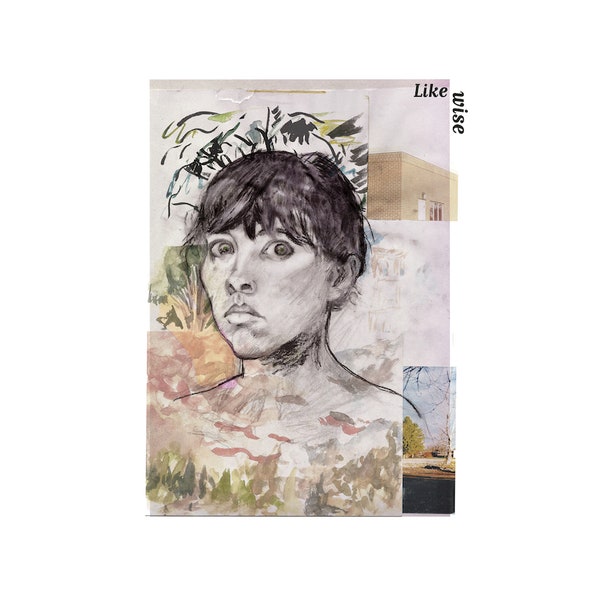
Frances Quinlan
Likewise
[Saddle Creek]
As the leader of Hop Along, Frances Quinlan has already shown time and time again that she has both the lyrical and vocal chops to body slam her way into anyone’s attention. On her first solo outing under her own name there’s a slight change in palette – a bit more keys and electronic, a little less racket – but the songwriting prowess remains. Here we follow Quinlan’s bustling mind through observations of marginalia, divine meals, dreams, love, road trips and many more winding trips down this particularly detailed memory lane. No matter what it is, there’s a wistful romance to it all that could only come from her unique pipes and perspective. Oh, and the reimagined cover of Built To Spill’s “Carry The Zero” that closes the album is something to behold as well.
-Rob Hakimian
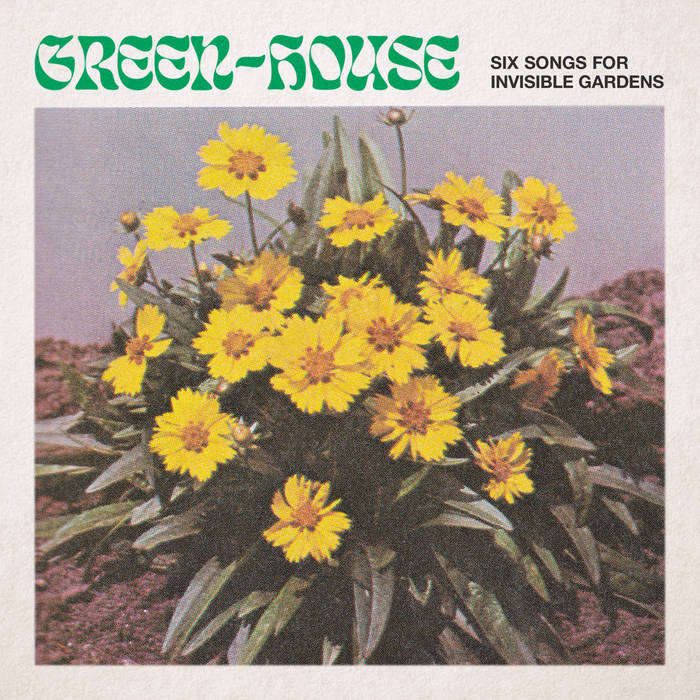
Green-House
Six Songs for Invisible Gardens
[Leaving Records]
Financial markets are tumbling, people are dying, coronavirus is spreading. I turn on the news or browse my social media feeds and I’m literally frightened for the first time in my life. Among the few tricks I use to assuage my troubled mind is music, and I may have found the perfect slice of an aural antidote to life’s daily worries. This 27-minute offering from Green-House is aptly titled Six Songs for Invisible Gardens, and I believe that even creatures from the plant kingdom will rejoice when you turn this on and let it fill your living space. Green-House, aka Olive Ardizoni, has created something really special here; she’s reimagined lullabies for today’s adults that burrow into long-forgotten corners of the human mind and untangle all that stress and anxiety. You know those mobiles that hang from an infant’s crib and play the most soothing and innocent sounds? Green-House has created nearly 30 minutes of lullabies for one’s inner infant. I didn’t even know I had an inner infant until I sat down with this album and let it work its magic. This music taps into old psychic “safe spaces” – imaginative landscapes that used to be my entire world before I became a jaded toddler. Seriously, this collection of music has made me realize that my “inner infant” didn’t disappear or die away; life just got busy and complicated and I got sidetracked. I just forgot. I’m hoping Olive Ardizoni continues along this path and presents us with much more of the same. Olive, if you’re reading this, please consider gifting humanity with more Green-House; the world needs this music now more than ever before.
-Scott Zanassi

Halsey
Manic
[Capitol Records]
Halsey’s Manic is an album that’ll sneak up on you. Yes, the production is generally safe, not altogether different from the sounds you’d find on near any massively popular pop star. You may even dismiss it for this reason at first. I did. Yet, I found myself called back to “More”, a devastatingly deceptive tune, one you’ll assume is a love story, until you realize it’s a love letter to the singer’s children, lost to miscarriages. From there, I gradually gravitated to “929”, the conclusion, and emotional peak, of the album. Here, and throughout Manic, Halsey spirals in and out of control, clawing for redemption, often coming up with only more baggage. Soon, I was listening straight through, from the regretful shade of “You Should Be Sad” to the all-too-relatable existential pout of “I Hate Everybody”. For a star so prominent, Manic is bracingly open, so personal that it can almost feel invasive listening. Therein lies its power. Eventually, the sonic backing hardly even matters, it’s all consumed by the raging power of Halsey’s grief, self-loathing, and, ultimately, defiant hope.
-Chase McMullen

Jody Wisternoff & James Grant
Anjunadeep 11
[Anjunadeep]
There’s a reason house fans await the latest Anjunadeep mix each and every year. While plenty of labels put together compilations to shine a light on their talent, new and old, these releases always seem to have an aura around them. Collected and mixed with care, they serve as both a platform for the artists featured, and as a genuinely delectable listening experience, the equal of any DJ-Kicks. These 38 tracks, chosen with care by DJ Jody Wisternoff and label co-founder James Grant feel particularly special, making Anjunadeep 11 perhaps being the strongest entry in the series to date. More than ever before, new voices in the label’s legendary lineup get their time to shine, while mainstays also make ambitious appearances. Perfect as a warm up for a night out, which, granted, we might not have on the horizon, you can instead let these tracks warmth rush over you, perhaps making this whole coronacation a bit more bearable.
-Chase McMullen

Key Glock
Yellow Tape
[Paper Route EMPIRE]
Key Glock seems almost destined to be underrated. While hip-hop culture gravitates ever more towards the empty, vacuous facades of a Lil Baby or Gunna, Glock’s workmanlike, blunted style remains fatally reliable. Yellow Tape is just the latest proof that the Memphis rapper deserves to be at the very forefront of his generation. If he’d had the luck to come up in the time of Young Jeezy, he’d have been an instant star. Instead, he continually receives relative hype, without ever fully crossing over to stardom. With hard-hitting beats, at once simple yet deceptively creative, and verses so in your face you’d swear he’s in the room yelling at you to get your life together, this is a trap tape for anyone in need of some damn get-up-and-go. Hell, in 2020, don’t we all?
-Chase McMullen

Khruangbin & Leon Bridges
Texas Sun
[Dead Oceans]
Arguably one of the most exciting collaborations to pop up in 2020 thus far, the happy meeting of the Houston trio Khruangbin’s Tex-Mex soul psych and Leon Bridges’ intense R&B witchy vocals gave birth to a four-track release whose sonic uniqueness makes pinning it down both place and time-wise an impossible task. From the title-track opener’s enchanted gathering of three different guitar playing styles (and Bridges’ voice ripping it open like raw moonshine over an infected wound) to the laid-back coolness of “C-Side”, from “Midnight”’s slick honey-pouring adult lullaby to “Conversion”’s filmic beauty in a disconcerting Marvin Gaye-like incantation, Texas Sun is a magical journey whose only faux-pas is being way too short.
-Ana Leorne

The Leonard Simpson Duo
LSD
[Jakarta Records]
A slice of old school heaven, LSD is the result of genius-meets-genius collab between Detroit rapper Guilty Simpson and New Zealand producer Leonard Charles, who have come together as The Leonard Simpson Duo to treat us to this superb 70s-inspired LP. Mixing jazz-rock delicacies with exquisite samples and an overall über-impressive production, LSD navigates a dreamlike territory of references that range from Motor City’s finest to African records revival. LSD is an intense trip to be experienced in full dose, although personal favourite highlights can be found in “Friends”, “Nobody”, and the closer chef d’oeuvre “Smokin’ Good”.
-Ana Leorne

Luminous Bodies
Nah Nah Nah Yeh Yeh Yeh
[Box Records]
This album is rotten to its core and smells of stale beer and seven days worn sweaty clothes, and there’s a weird metallic smell coming from somewhere that could be anything or nothing. Luminous Bodies’ second album is drenched in that certain form of hedonism that starts off grubby and goes downhill from there. In short, this is a party album for those who obey the riff.
Opener “Sykes” starts with a feedback squeal reminiscent of The Stooges’ “I Wanna Be Your Dog” and they follow the same template as Iggy and the gang from all those years ago – beauty in brutal simplicity. “Fuck the Beatles” is a stormer whilst “I Wish I Had a Window” languishes in full on stoner-psych nirvana. This album is exactly what you’d expect from members of Terminal Cheesecake and Ikara Colt: wonderfully riotous.
-Todd Dedman

Mieko Shimizu
I Bloom
[Street Furniture Ltd]
I Bloom is Mieko Shimizu’s first album under her full name since 1990. She’s maybe best-known to J-pop buffs for her collaborations with her brother, Yasuaki Shimizu, but in the three decades since she’s relocated to London and worked on projects as diverse as a drum and bass side project (Apache 61), scoring ballets, and writing for the London Symphony Orchestra. I Bloom shows the results of this unique history in this set of emotionally bare, powerful songs. Musically, her blend of synthesizer soundscapes and intricate IDM beat programming with lush and eclectic arrangements (including koto, harp, and glockenspiel) makes Björk an easy source of comparison, but in interviews she’ll cite artists ranging as wide as Laurie Anderson, Iannis Xenakis, and Autechre. This history and influences lead to thickly textured, intricate arrangements on each minute of the album, but even on the quietest songs, they never crowd out Shimizu’s voice and direct piano-driven songwriting. She can do pretty and tranquil on songs like “Lazy Light” (a collaboration with ex-Cardiacs member William D. Drake) and the serene closer “Bridge Beyond”, but she is at her most memorable at her most forceful, like on “The Change is Coming” where she builds a rousing mantra out of “The change is coming, you are in the way.” I Bloom culminates decades of work of a fascinating artist who’s spent too long behind the scenes, and hopefully the blooming promised by the title points to more music to come.
-Josh Sand
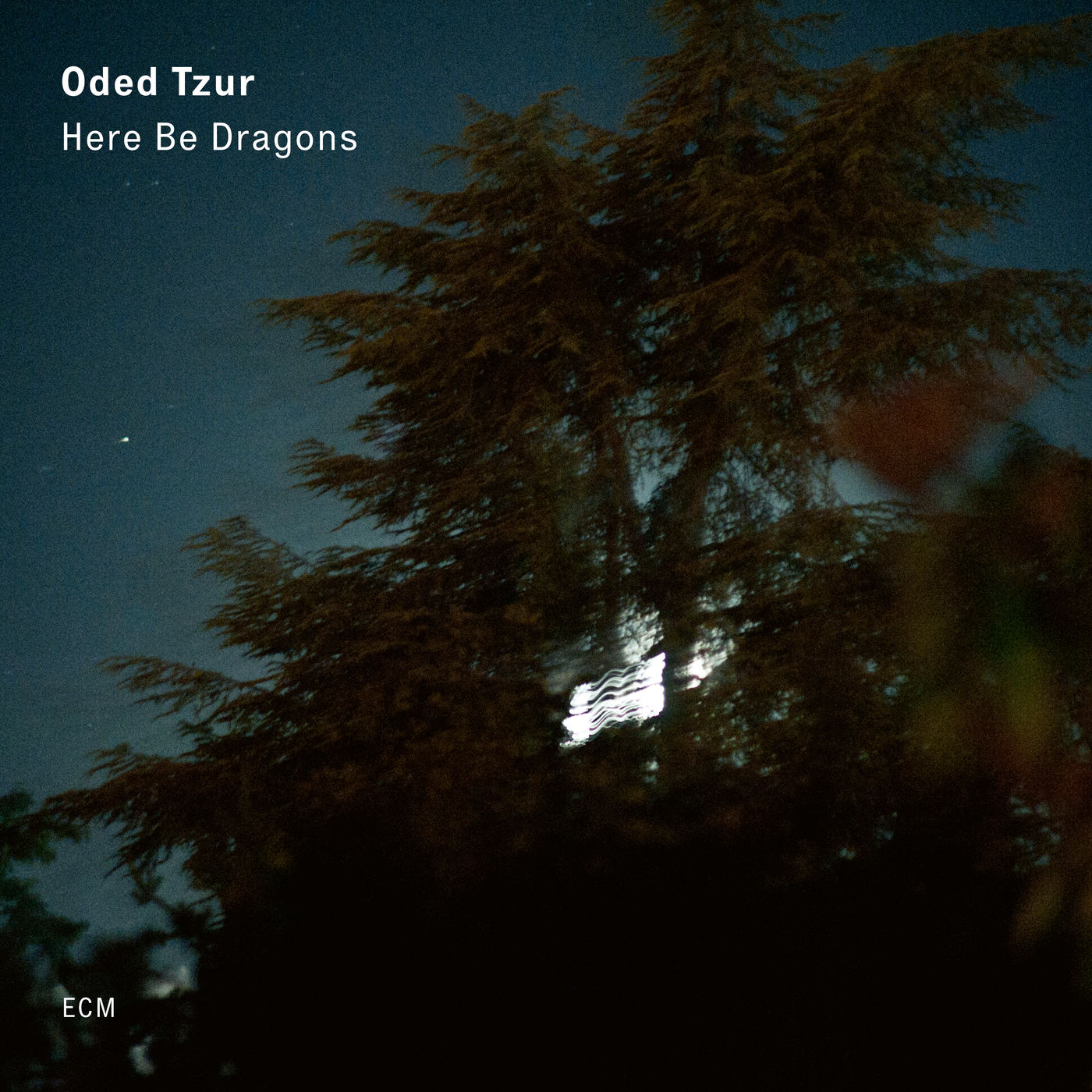
Oded Tzur
Here Be Dragons
[ECM Records]
Here Be Dragons is Oded Tzur’s debut on legendary jazz label ECM, but his third release as bandleader. The melodic instruments here — tenor saxophone, piano, and double bass — are played like a pact was made to only operate in the softest, purest tones of each instrument, and the drums never rise above a punctuating rustle. It’s spare music, but spare in the way that gives space to its warm and melodic tendencies, most explicitly on the three “Miniature”s, which give solo time to the piano, bass, and sax. By working in such gentle territory, melodies have the space to grow emotive and tender, or moody and exploratory, in ways that keep the music arresting even when it’s barely there. If the warm heart of this album wasn’t obvious by the end, it closes by pulling an achingly gentle lullaby out of Elvis’ “Can’t Help Falling in Love”. It’s releases like these that keeps ECM so trustworthy after decades.
-Josh Sand

Pet Shimmers
Face Down in Meta
[Self-released]
The debut album from this quasi-super group — headed by neo-psyche overlord Oliver Wilde — is an alluring deep dive into experimental haze, that only artistic minds like Harmony Korine are capable of manifesting into some twisted reality. Constantly shifting through glittery grandeur and grating lo-fi weirdness with intended discord, it’d be easy to deem this project as simply facetious, especially with song titles like “Post-Dick Circle Fuck”. Regardless of its messaging or jarring sonic gymnastics, Face Down in Meta will persist through 2020 as one of the more fascinating experiences of the year, but will also continue to unnerve listeners to the core.
-Kyle Kohner

Pia Fraus
Empty Parks
[Seksound]
Empty Parks, the sixth album by Estonians Pia Fraus, is like Schrödinger’s dream pop album: simultaneously serene and feverish. Its compositions are brilliantly layered and give you tones that will run abuzz in your mind for days. This starts with the shimmers of synths and surges of guitar and extends to the synergistic passion of co-vocalists Eve Komp and Rein Fuks. Tracks like “You’re Not In Love” are indescribable yet perfectly capture the indescribable. More than 20 years into their career, Pia Fraus have made an album that shows inspiration from your surroundings and lust for life (and music) isn’t limited to your earliest days of artistic endeavors, even in a subgenre that practically demands the most youthful influence possible.
-Brody Kenny

Poolside
Low Season
[Pacific Standard Records]
Missing the plucky sounds of summer? As winter turns to spring, Poolside’s Low Season revs into overdrive and slides us oh-so-casually and confidently into those summertime beats. The daytime disco Poolside has curated over the course of his career progresses into a more accessibly pop direction here, with a much larger focus on featured vocalists that allows these eight tracks to remain varied. “Can’t Stop Your Lovin’” is a certified jam while the softer “Around The Sun” oozes warm retro vibes. From the moment the smooth sax kicks things off on the opening number you’re gently escorted to the sun lounger of life, where the only thing to do is simply relax and sip on your cocktail. Sometimes the surface level is the best – and when it’s this classy it’s not hard to enjoy.
-Lauren Mullineaux
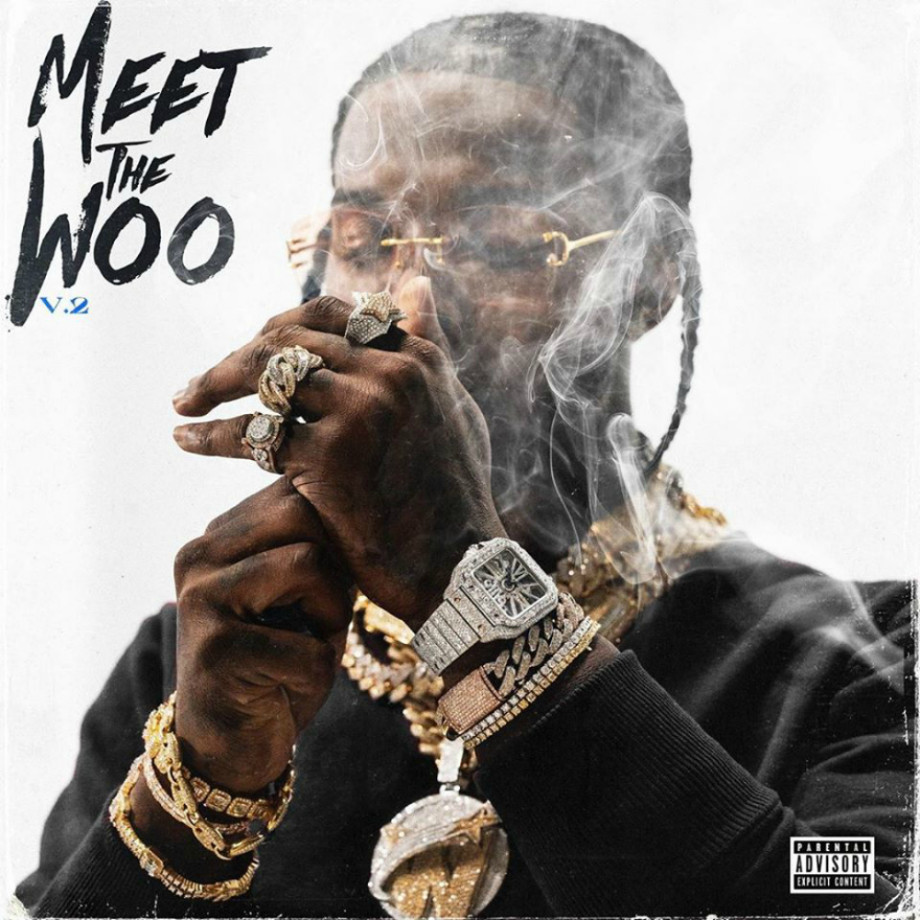
Pop Smoke
Meet the Woo 2
[Victor Victor Worldwide / Republic]
This is an eerie release to revisit in March. However tragically his death displayed the opposite, Meet the Woo 2 is music for feeling invincible. Beyond the epic opener that bluntly says as much, song for song, this is music coming from a kid who’d just begun reaching his goals, and the glorious rush of joy, ego, and pride that followed. It’s easy to see why New York City was feeling they finally had an heir apparent to their city’s one-time dominance, and while the 50 Cent comparisons upon his death may have been premature, we can only hope that the one-time G-Unit general does justice to this fallen star’s fledgling legacy (no Post Malone, please) with the posthumous album he’s taken it upon himself to lovingly curate. Meet the Woo 2 provides him quite the bedrock to build from.
-Chase McMullen

Royce da 5’9”
The Allegory
[Heaven Studios, Inc.]
The man says it himself, right on track three of The Allegory: he doesn’t age. While his more famous BFF and Bad Meets Evil partner Eminem thrashes about in search of a creative voice that suits his ageing brand, Royce da 5’9” has stayed defiantly self-aware. Now, 18 years after his debut, he may well have put out the most consistent and cohesive album of his career. As one glance at its artwork will tell you, The Allegory feeds off of righteous anger and political fatigue. It’s also the first LP primarily produced by Royce himself, and he proves surprisingly adept on the boards, offering throwback vibes that still manage to sound current. The guest list is impressive, with the entirety of Griselda appearing, on different tracks each, among many others. Are there stumbles? To be sure. Royce proving to be an anti-vaxxer is grating, as are his attempts at addressing homophobia, but they add to an honest portrait of a flawed man, building an astonishingly strong later career salvo. You don’t always have to like him, but you will respect him.
-Chase McMullen

Tomás Tello
Cimora
[Discrepant]
Whatever one considers this current movement – a sort of Fourth World resurgence – I think we can all be glad it’s happening. Forward-thinking music deeply inspired by respective artists’ cultural pasts, the boom has already led to masterpieces by the likes of Meitei and Nicola Cruz. Add Tomás Tello to the growing list. The Peruvian multi-instrumentalist has been honing his craft across a decade, using native instruments such as charangos and quenas to experiment with something bordering on ambient, yet, much like Meitei’s Komachi, wholly unique. Yet, it shares more in common with Cruz’s Siku; both honor and explore Andean culture, looking to a past nearly faded from view to craft urgent, vital experimental music. Considering himself something of an “antenna”, Tello strives to connect with his cultural past, and the result, Cimora, is among the greatest moments of harmony yet offered in 2020.
-Chase McMullen

Tricot
真っ黒
[AVEX ENTERTAINMENT INC.]
真っ黒 marks the continued evolution of Kyoto band Tricot, who have spent 10 years now creating frantic and wildly fun math-rock. Though it’s true their take on the genre might not exactly sound original to some ears, their music has always had its own unique quality capable of drawing attention. Tricot have been smoothing over the rougher edges of their music with each release, peeling away their normally chaotic exteriors and revealing a pop sensibility that had been there all along, waiting to bubble up to the surface. On 真っ黒 the shift in sound continues with songs like “あふれる”, “ワンシーズン”, and “真っ黒” pairing irresistibly sweet harmonies with gleefully chaotic arrangements, whereas elsewhere a greater sense of structure comes into play. “危なくなく無い街へ” especially stands out as probably the prettiest and most straightforward thing they have ever written. Where some bands lose the spark that brought them together after so many years of being together, Tricot clearly haven’t lost a single bit of it. What makes albums like this work is how they are finding different ways of channelling their playful spirit without losing any of the excitement of their early releases, which in itself isn’t exactly an easy balance to maintain.
-Jeremy Monroe

Ulla
Tumbling Towards A Wall
[Experiences Ltd]
The fourth album from Philadelphia-based producer Ulla [Strauss] is without a doubt one of her best, if not her most accomplished yet. Building off of the increasingly experimental approach to ambient music she took on her previous albums – which sometimes featured jazzy textures and off-kilter percussion – Tumbling Towards a Wall also refines her occasional blind spots to produce a cohesive set of songs that work together in creating a singular mood piece. From the hypnotic bliss of “something I can’t show” to closer “I Think My Tears Have Become Good” (which makes use of a fragile piano refrain and glitchy white noise to create a deep sense of longing) it sets itself apart from your average ambient album in how it’s able to create the kind of intimacy most fail to develop. Odd percussive elements, hissing white noise, murmuring voices, distant chirping birds, and watery guitars create layers of unique textures all while maintaining its sense of tranquil space. The music moves along like little ripples, sometimes giving the impression it’s suspended in mid-air, and what little percussion there is guiding it rarely breaks out into anything resembling a traditional beat. As a whole, it feels like a sequence of dreams and memories being stitched together and creating a continual sequence washing over you and pulling you into its gauzy space. The effect is a little disorienting, but, in a pleasant way, and it offers at least a small window of escape from an otherwise increasingly uncertain reality.
-Jeremy Monroe

Walter Martin
The World at Night
[Family Jukebox]
The World at Night is dedicated to the departed Stewart Lupton, Walter Martin’s childhood friend and former bandmate in Jonathan Fire*Eater, but it’s not a sad sounding album. It’ll pull your lower lip out, but it’ll do it when it’s sounding its happiest. All the elements line up here for maximum bittersweet nostalgia: Martin’s lyrics overflowing with an earnest, boyish innocence (polka dots, childhood daydreams, holiday presents), Martin’s no-nonsense singing style, like he’s talking directly to the listener, and old-timey jazz arrangements evoking wicker rocking chairs and long afternoons reminiscing (think Randy Newman’s “Dayton, Ohio – 1903” or The Blasting Company’s soundtrack to Over the Garden Wall). There’s emotional reprieve with songs like “That’s All I Need” in the middle of the album, singalongs that don’t hide Walter Martin’s past work blurring the lines of children’s music, but then it’s back to whamming you in the heart with “The Soldier”, one of the most devastatingly sweet songs ever written for one’s in-laws. The World at Night adds up to a rare album that feels like it’s giving you a gutpunch and a hug at the same time. Albums this earnest and heartfelt don’t grace us every day and they deserve to be treasured.
-Josh Sand
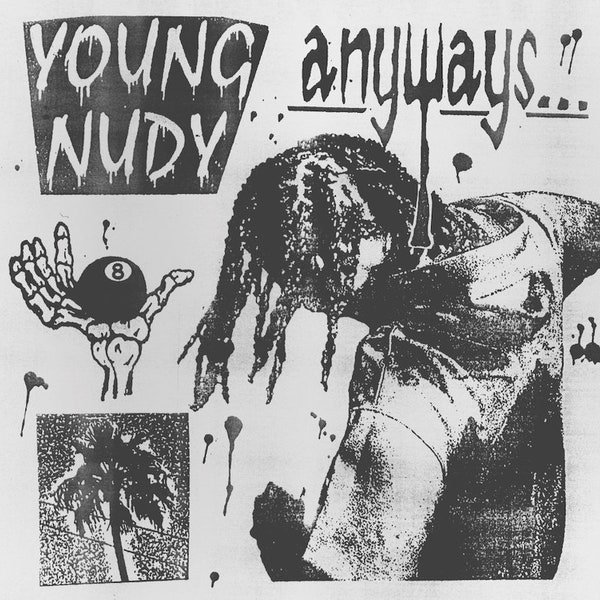
Young Nudy
Anyways
[RCA]
All of the love bestowed upon Lil Uzi Vert’s endlessly hyped but ultimately hollow Eternal Atake could’ve gone to another young Atlantan. Young Nudy, cousin of 21 Savage, isn’t exactly a fresh face on the scene, and his latest release has a title that sounds tossed-off even by mixtape standards: Anyways. Yet, this is an hour of no features and a limited range of topics that never feels one-dimensional. Two things help immensely. First is Nudy’s ear for beats, which often have a woozy vibe while keeping you at attention with their melodies. Second is Nudy himself: jumping through flows while always sounding unbothered about it. On standout “Blue Cheese Salad”, he puts it as such: “Bitch, I live a savage life and bitch, I live it lavish.”
-Brody Kenny

